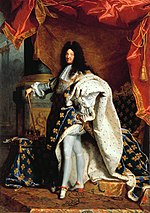
Louis XIV of France, widely considered an ‘Absolute Monarch’.
This learning pathway will provide you with an understanding of how Absolutist political systems developed in Europe and elsewhere. It explores how a long history of warfare in Europe, followed by the Treaty of Westphalia, created new conceptions of power and sovereignty. The spread of gunpowder technology led to fundamental changes in warfare and contributed to the rise of powerful, centralized states. This learning pathway also considers colonization during the 1600s and 1700s and ongoing conflicts for control of trade, territory and influence.
During this learning pathway you will complete five readings on Absolutist political systems, the impact of gunpowder on warfare, and colonization.
- Obtain an overview of how Absolutist political systems arose in Europe, the Middle East and Asia.
- Examine the impact of gunpowder on warfare and how new methods of warfare led to the development of centralized states.
- Learn about conflicts over colonial possessions in the Americas and the growing dominance of Northern European states.
This learning pathway will provide you with an understanding of how Absolutist political systems developed in Europe and elsewhere. It explores how a long history of warfare in Europe, followed by the Treaty of Westphalia, created new conceptions of power and sovereignty. The spread of gunpowder technology led to fundamental changes in warfare and contributed to the rise of powerful, centralized states. This learning pathway also considers colonization during the 1600s and 1700s and ongoing conflicts for control of trade, territory and influence.
During this learning pathway you will complete five readings on Absolutist political systems, the impact of gunpowder on warfare, and colonization.
Objectives
Content is available under the
Creative Commons Attribution Share Alike License.
Privacy Policy | Authors